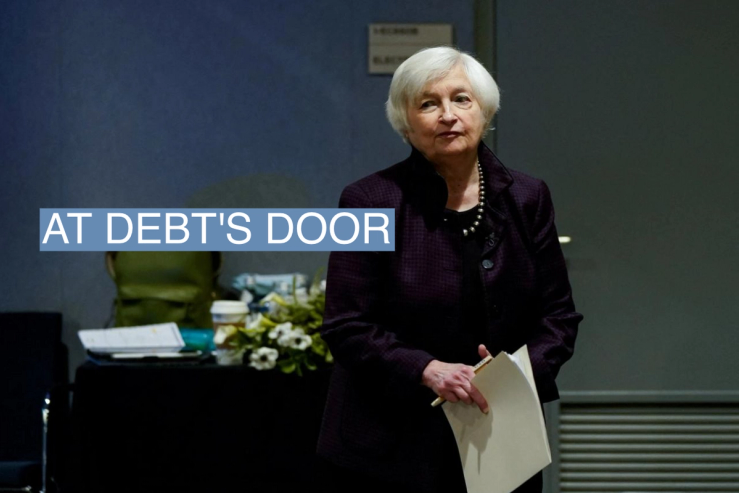The News
The U.S. hit its debt ceiling on Thursday, ensuring political chaos over the next several months as Democrats and Republicans negotiate on how much — or whether to — raise it.
In the meantime, Treasury Secretary Janet Yellen said her department will begin taking so-called “extraordinary measures” that will likely allow it to continue paying the nation’s bill’s until early summer.
Here’s what you need to know about the economic situation — and what will happen if Congress doesn’t raise the limit.

What is the Debt Ceiling?
Unlike the vast majority of other countries, the U.S. government has an official limit on how much debt it can borrow in order to fund its daily business. (Denmark is the other famous example, but it sets the max so high that nobody really worries about it). A relic of WWI widely loathed by economists and investors the world over, the cap is currently set at $31.4 trillion.
Crucially, America’s debt ceiling does not limit government spending. Rather, it simply prevents the government from issuing new bonds to cover obligations already on its books, including paying existing Treasury holders.
What are “extraordinary measures?”
Not something to worry much about, for starters. They basically amount to tricky accounting. When the government reaches that limit, the U.S. Treasury can bypass Congress and move around money from different funds in order to meet demand.
Dr. Wendy Edelberg, a senior fellow of economic studies at the Brookings Institutes, described these measures to Semafor as “fancy footwork” which would involve the Treasury not reimbursing certain trust funds or certain intergovernmental accounts, or suspending investments into things like federal retiree funds.
In a letter to House Speaker Kevin McCarthy on Thursday, Yellen confirmed that the Treasury had begun suspending investments to the retiree accounts.
“I respectfully urge Congress to to act promptly and to protect the full faith and credit of the United States,” Yellen wrote.
These extraordinary measures won’t be felt by ordinary Americans. But eventually the money in the government’s accounts will dry up, and the U.S. won’t be able to pay everything it owes. The date that’s expected is referred to as the “X date;” Treasury doesn’t know exactly when on the calendar that day will fall, but in an earlier letter Yellen told lawmakers that it probably won’t be before early June.
What happens if the debt ceiling binds?
Once the debt ceiling actually starts to stop the government from paying its bills, or “binds” as the wonks say, then the real crisis will begin, likely leaving the financial markets in turmoil.
“It would be not so different than your mortgage company or your credit card company saying: ‘You owe money,’ and you just not paying,” Edelberg said. “It would be a big deal.”
But it remains unclear exactly what would happen, since — with the exception of some payments that were temporarily delayed due to a technical glitch in 1979 —the U.S. has never defaulted on its debt.
In the past, many have suggested that the government should be able to “prioritize” payments — basically paying bondholders to avoid default while shutting down other parts of the government. That would potentially mean halting things like Social Security checks. But in the past, Treasury Department officials have suggested that prioritization is impractical, and that the government can’t make assurances against a default.
Should we be worried?
This is not the first time the Treasury would have to begin using extraordinary measures, and Congress has eventually raised the debt limit in each case. But Edelberg said she is not as optimistic this time, adding that some members of Congress no longer believe in bipartisan negotiation and are just here to “sow chaos.” (A not uncommon feeling in Washington at the moment.)
“I’m certainly more worried this time around,” she said. “The House right now looks like it’s an enough disarray that I’m not sure that there will be reliable negotiators.”
She added that regardless of what happens in Congress, the economic state of the country is already so fragile — with the Treasury continuing to raise interest rates on bonds — that these new measures are unlikely to help the volatile financial markets.
“This is a particularly bad time to throw a bomb into all this,” she said.

